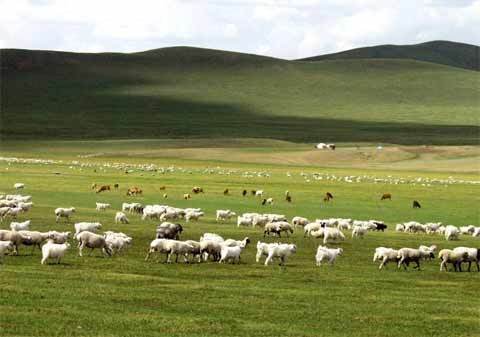Climate change offers pros, cons for grain supply
 0 Comment(s)
0 Comment(s) Print
Print E-mail China Daily, December 24, 2012
E-mail China Daily, December 24, 2012
Changes in rainfall and a concentration of greenhouse gases triggered by climate change may lead to an increase in China's grain yields in per-unit production over the next few decades.
But negative effects of climate change, including extreme weather, plant diseases and a rising number of insects, will pose a threat to grain supply security, experts said.
 |
|
Climate change offers pros, cons for grain supply |
They added a rising population and arable land loss will also pose greater potential risks to the country's aims to ensure adequate food supply.
The precipitation pattern will change nationwide starting around 2015 due to atmosphere circulation, said Qian Weihong, a professor in the Department of Atmospheric and Oceanic Sciences at Peking University.
"By 2020, parts of North China will enter the peak period for precipitation," Qian said.
In China, the southern regions used to receive more rainfall and snowmelt every year, while the northern regions are prone to drought due to lack of water.
His predicts are similar to conclusions reached by climate models for the next 20 years that were released by the National Climate Center of the China Meteorological Administration in November.
Changes in rainfall have already occurred, said Song Lianchun, the center's director.
From Jan 1 to Nov 5 this year, average precipitation volume reached 557 millimeters, about 8 percent more than the average since recording began in the 1950s.
According to Qian, some of the country's major grain-producing regions, such as those in Northeast China, will see an increase in precipitation at around 2015.
As the world's most populous country, China recorded a grain output of 589 million metric tons in 2012, the ninth consecutive year of growth, according to the National Bureau of Statistics.
Tang Huajun, deputy dean of the Chinese Academy of Agricultural Sciences, said climate change may partly have a positive effect on the country's grain output if the global trend continues.
"A 3 to 11 percent increase in grain yields per unit is foreseeable from 2030 to 2050, considering the higher emission of greenhouse gases," he said, citing a mid-term research result from his academy.
The five-year research project, launched by the CAAS in 2010, is designated by governmental authorities to monitor the impact of climate change on grain production.
"But in the meantime, a series of negative effects caused by climate change - extreme weather, such as drought and flood, as well as plant diseases and insects - will pose increasing threats to grain supply security," said Tang, chief scientist for the five-year research project.
Agricultural professionals also warned that other great challenges, such as population growth and arable land loss, will have potentially grave effects on China's ambitious target of maintaining grain self-sufficiency.
The country's population is expected to peak at about 1.5 to 1.6 billion in 2030.
China's arable land may shrink to 105 to 111 million hectares in 2050, well below the current 122 million hectares, the bottom line for arable land set by the government to satisfy agricultural production, said Tang.
The prediction was based on government data on the urbanization rate and arable land from 1980 to 2005.
"Compared with strong negative effects of the rising population and shrinking arable land, favorable conditions due to climate change are quite limited to the country's food security," said Tang.
Tang suggested China introduce more new varieties of crops, for instance drought-resistant varieties, to plant in southern regions to cope with local climate change.
His research project will work to predict future changes in the country's planting locations due to climate change, especially for the three food staples of rice, wheat and corn.






Go to Forum >>0 Comment(s)